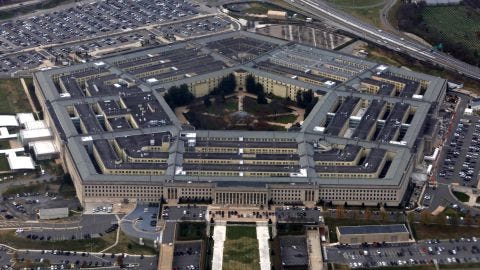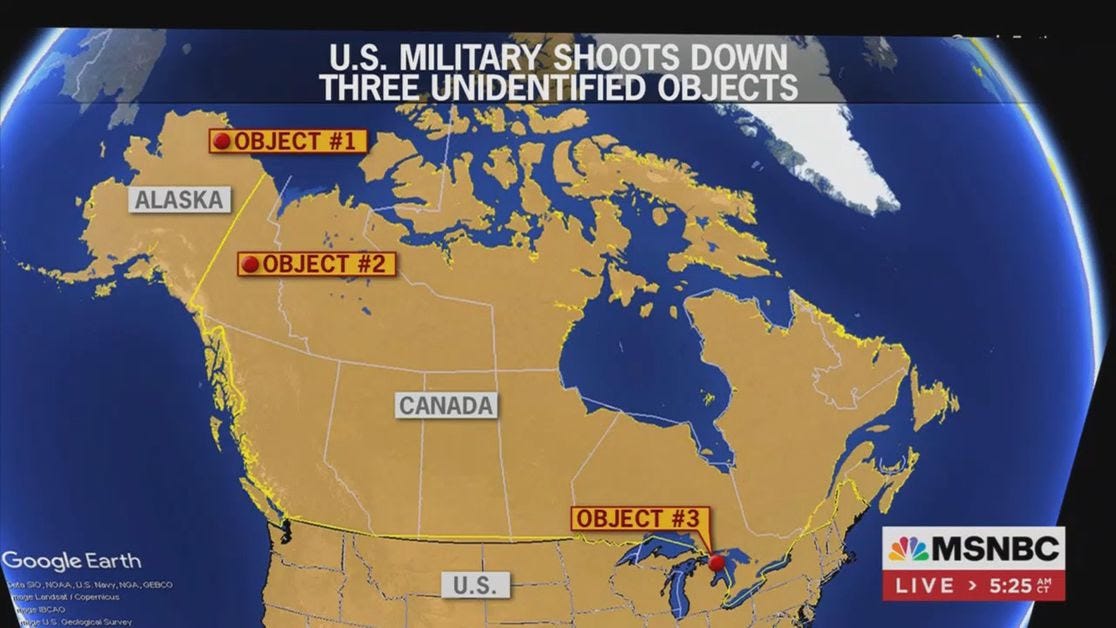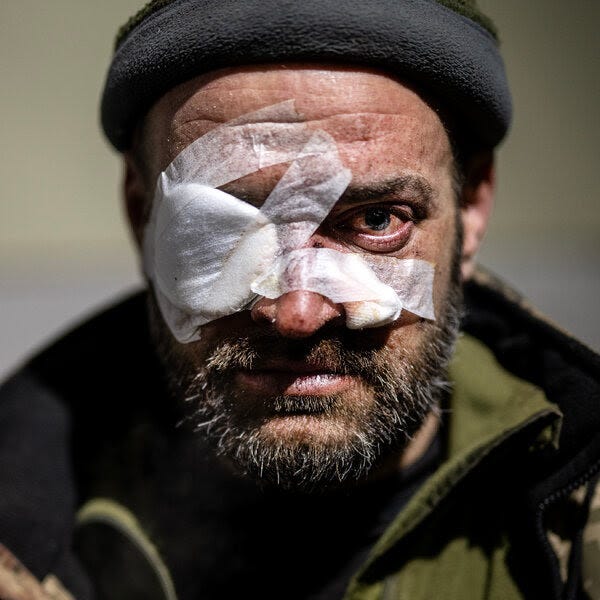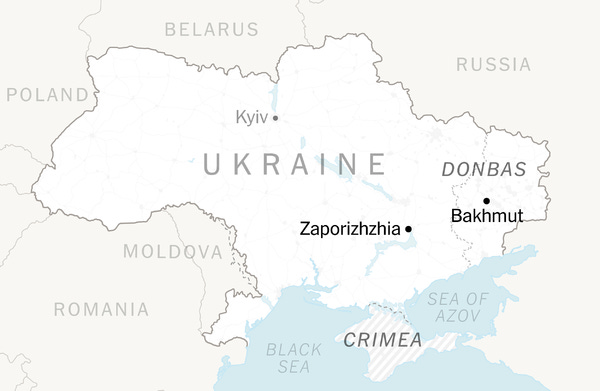The Full Belmonte, 2/13/2023
Mahomes, Chiefs beat Eagles 38-35 in Super Bowl LVII1 of 13
Kansas City Chiefs defensive end Carlos Dunlap celebrates with the Vince Lombardi Trophy after the NFL Super Bowl 57 football game, Sunday, Feb. 12, 2023, in Glendale, Ariz. The Kansas City Chiefs defeated the Philadelphia Eagles 38-35. (AP Photo/Ashley Landis)
“GLENDALE, Ariz. (AP) — Patrick Mahomes was magical when the Kansas City Chiefs desperately needed him to pull off another Super Bowl comeback.
Playing on an injured ankle, Mahomes threw two touchdown passes in the fourth quarter and scrambled 26 yards on the go-ahead drive before Harrison Butker kicked a 27-yard field goal with 8 seconds left to give the Chiefs a 38-35 victory over the Philadelphia Eagles on Sunday night.
The Chiefs won their second NFL title in four years and two-time NFL MVP Mahomes earned his second Super Bowl MVP award…..” Read more at AP News
US military shoots down high-altitude object over Lake Huron on Sunday
The Pentagon in Arlington, Virginia, is seen on November 29, 2022.
Alex Wong/Getty Images
CNN —
“The US military shot down another high-altitude object over Lake Huron on Sunday afternoon, according to a US official and a congressional source briefed on the matter.
A second US official said the takedown of the unidentified object was ‘at the direction’ of President Joe Biden.
The operation marks the third day in a row that an unidentified object was shot down over North American airspace. An unidentified object was shot down over northern Canada on Saturday. On Friday, an unidentified object was shot down in Alaska airspace by a US F-22.
And last weekend, a suspected Chinese surveillance balloon was taken down by F-22s off the coast of South Carolina.
Democratic Rep. Elissa Slotkin of Michigan said Sunday that the operation to down the object over Lake Huron was carried out by pilots from the US Air Force and the National Guard.
‘Great work by all who carried out this mission both in the air and back at headquarters. We’re all interested in exactly what this object was and it’s purpose,’ she said in a tweet.
Republican Rep. Jack Bergman of Michigan also confirmed the operation Sunday, tweeting, ‘The US military has decommissioned another ‘object’ over Lake Huron.’
‘I appreciate the decisive action by our fighter pilots,’ he said.” [CNN]
4 shootdowns, 8 days
Map: MSNBC's "Morning Joe"
“Perhaps based on increased vigilance rather than fresh threats, the U.S. yesterday shot down the fourth airborne ‘object’ in eight days.
Defense officials said during an off-camera briefing, held during the Super Bowl, that they don't yet know if the most recent three objects were balloons, or even how they're propelled.
Why it matters: The mysterious chain of events over U.S. airspace has no peacetime precedent, the briefers said.
Between the lines: The Pentagon briefers allowed for the possibility that the objects are commercial and innocuous — they haven't recovered them yet, and just don't know.
The N.Y. Times reports one U.S. theory: ‘China or Russia sent the objects to test American intelligence-gathering capabilities.’
The shootdowns:
Two Saturdays ago, off South Carolina: The Chinese spy balloon was shot down after traversing the U.S. for most of the week.
Friday, off northern Alaska: An Air Force F-22 fighter shot down a ‘high-altitude object’ that was flying at 40,000 feet and posed a threat to civilian airliners, the Pentagon said. The object — which was about the size of a small car, and bore no resemblance to the Chinese balloon — dropped onto sea ice near Deadhorse, Alaska.
Saturday, over northern Canada: An F-22, coordinating with Canada, used a missile to shoot down a high-altitude airborne object that NORAD had detected over Alaska late Friday. (Read the statement.)
Yesterday, over Lake Huron, Mich.: At the direction of President Biden, ‘out of an abundance of caution,’ an F-16 fired an AIM9x missile to ‘shoot down an airborne object flying at approximately 20,000 feet altitude in U.S. airspace.’ (Read the statement.)
Could these be aliens? At the briefing, Air Force Gen. Glen VanHerck, head of NORAD and the U.S. Northern Command, got the internet excited by saying when asked whether he ruled out aliens or extraterrestrials:
‘I'll let the intel community and the counterintelligence community figure that out. I haven't ruled out anything.’
Reality check: The N.Y. Times reports that "national security officials discounted any thoughts that what the Air Force shot out of the sky represented any sort of alien visitors."
"No one, one senior official said, thinks these things are anything other than devices fashioned here on Earth."
Earthquake
“The death toll across Turkey and Syria following last Monday's catastrophic earthquake has reached at least 36,000, officials said in an update today. Teams are still rushing to save victims that could be alive under the rubble -- even as authorities warned the chances of finding survivors are becoming increasingly unlikely. Aid organizations are also trying to deliver urgent supplies, but their efforts are being complicated by Syria's long-running civil war in quake-hit areas in the north, much of which is held by rebels. The UN Emergency Relief Coordinator on Sunday stressed the need to ‘open more access points’ to get aid out quicker. Meanwhile, Turkish authorities have arrested a number of property developers blamed for building collapses as public anger over the quake response grows.” [CNN]
Immigration
“The number of unlawful crossings at the US-Mexico border in January dropped to the lowest point since February 2021, according to administration officials. In January, the US Border Patrol made about 128,000 apprehensions, down 42% from December, administration officials said Friday. In recent weeks, administration officials have cited a new program that provides a legal pathway to the US as contributing to a drop in border crossings. Encounters with migrants from Cuba, Haiti, Nicaragua and Venezuela -- the four nationalities that benefit from that program -- have declined dramatically. However, border numbers often fluctuate, so it's unclear how long the trend will hold. Title 42, which allows authorities to turn away certain migrants at the US-Mexico border, could also expire soon.” [CNN]
Trump campaign paid researchers to prove 2020 fraud but kept findings secret
An outside firm’s work was never released publicly after researchers uncovered no evidence that the election had been rigged for Joe Biden
“Former president Donald Trump’s 2020 campaign commissioned an outside research firm in a bid to prove electoral-fraud claims but never released the findings because the firm disputed many of his theories and could not offer any proof that he was the rightful winner of the election, according to four people familiar with the matter.
The campaign paid researchers from Berkeley Research Group, the people said, to study 2020 election results in six states, looking for fraud and irregularities to highlight in public and in the courts. Among the areas examined were voter machine malfunctions, instances of dead people voting and any evidence that could help Trump show he won, the people said. None of the findings were presented to the public or in court.
About a dozen people at the firm worked on the report, including econometricians, who use statistics to model and predict outcomes, the people said. The work was carried out in the final weeks of 2020, before the Jan. 6 riot of Trump supporters at the U.S. Capitol.
The attack: The Jan. 6 siege of the U.S. Capitol was neither a spontaneous act nor an isolated event
Trump continues to falsely assert that the 2020 election was stolen despite abundant evidence to the contrary, much of which had been provided to him or was publicly available before the Capitol assault. The Trump campaign’s commissioning of its own report to study the then-president’s fraud claims has not been previously reported.
‘They looked at everything: change of addresses, illegal immigrants, ballot harvesting, people voting twice, machines being tampered with, ballots that were sent to vacant addresses that were returned and voted,’ said a person familiar with the work who, like others, spoke on the condition of anonymity to describe private research and meetings. ‘Literally anything you could think of. Voter turnout anomalies, date of birth anomalies, whether dead people voted. If there was anything under the sun that could be thought of, they looked at it.’
The findings were not what the Trump campaign had been hoping for, according to the four people. While the researchers believed there were voting anomalies and unusual data patterns in a few states, along with some instances in which laws may have been skirted, they did not believe the anomalies were significant enough to make a difference in who won the election.
The research also contradicted some of Trump’s more conspiratorial theories, such as his baseless allegations about rigged voting machines and large numbers of dead people voting.” Read more at Washington Post
The war in Ukraine is entering a new phase. We explain each side’s strategy.
Pavlo, a Ukrainian soldier.Lynsey Addario for The New York Times
Signs of action
“The war in Ukraine appears to be on the cusp of a new phase.
Russia has intensified its missile attacks in recent days and called up about 300,000 new troops this winter. Many of them have gathered in eastern Ukraine, apparently preparing for an assault.
Russia’s goal seems to be the seizure of the entire Donbas region, in eastern Ukraine, by overwhelming Ukrainian forces with troops. ‘This is what has the Ukrainians beside themselves with worry,’ said my colleague Michael Schwirtz, who has been reporting from Donbas. As a wounded Ukrainian soldier named Pavlo told Michael, ‘It’s particularly difficult when you have 50 guys and they have 300.’
Today’s newsletter offers one of our occasional updates on the state of the war, with Times reporters around the world helping to answer two basic questions: What is Russia’s latest strategy? And what is Ukraine’s?
‘There are signs that both sides are going to do something in the weeks and months to come,’ Julian Barnes, a Times correspondent in Washington, told me.
Russia’s strategy
The war is almost a year old, and it has clearly gone much worse than Vladimir Putin expected. Russia has gained control of Ukrainian territory in the east and south but has been rebuffed elsewhere. U.S. officials estimate that about 200,000 Russian troops have been wounded or killed.
Still, even with all his failures, Putin has reason to believe Russia’s position might improve this year. He is relying on two dynamics. First, Russia is a much larger country, with many more resources, than Ukraine. Second, the war’s outcome matters more to Ukraine and Russia than to Ukraine’s foreign allies. That gap could ultimately cause Ukraine’s allies to slow their supply of crucial weapons and equipment.
‘The strategy of Putin is to wait out the West,’ Julian said, ‘then push again to seize so much land and kill so many Ukrainians that they negotiate an end to the war from a position of weakness and Volodymyr Zelensky’s government falls.’
So far, the West has remained largely united behind Ukraine. The latest sign of support: modern tanks that the U.S., Britain and Germany agreed to supply. But there are reasons to wonder how long the support will last. Germany seems conflicted about how strongly to confront Russia, and Germany’s chancellor, Olaf Scholz, has refused to say that Ukraine must win the war. In the U.S., some Republicans have criticized the military aid and argued that Ukraine is not America’s problem.
Russia is hoping to claim a new victory this week by seizing control of Bakhmut, a city in Donbas. (On Sunday, Russian fighters claimed to have captured a village just outside the city.) From there, they hope to take over more of the region. ‘Russia is going to try to surround Donbas and cut it off and wrest it away fully from Ukraine,’ Michael told my colleague Claire Moses.
By The New York Times
U.S. officials remain skeptical that Russia’s larger campaign to overrun eastern Ukraine will succeed, given the state of the Russian military. The troops called up in recent months are mostly inexperienced, and the war has already used up a lot of munitions and equipment.
‘The Russians may have the desire for a major operation,’ Julian said. ‘They lack the means.’
Ukraine’s strategy
Many analysts believe that a stalemate remains the most likely scenario for the rest of 2023. But both Ukraine’s leaders and the Biden administration believe a better outcome is plausible. The coming infusion of new military equipment, like the tanks, is a sign of this optimism.
The tanks have the potential to help Ukraine achieve its biggest medium-term objective: breaking the so-called land bridge that Russia has established between the territory it controls in the east, including in Donbas, and in the south, on the Crimean Peninsula. Doing so would be symbolically important for Ukraine and would make it costlier for Russia to supply troops in both regions.
One initial aim for Ukraine may be recapturing the Zaporizhzhia nuclear plant, inside the land bridge. ‘The plant provides an enormous amount of electricity,’ Julian said. ‘Taking it back would be the biggest gain of the counteroffensive to date.’
To prepare for its coming push, Ukraine has pulled some troops from the front lines and sent them to Germany, Britain and Poland. There, they are being trained in new units and learning how to use the tanks, artillery tubes and other equipment the West has recently supplied.
What’s next
Some observers think Russia has already begun its latest push, with the missile attacks signaling the start. Others think that the war’s next phase is still at least several weeks away; they argue that the more likely time for either side to launch a full offensive is this spring, after the weather warms and mud season has ended.
The next big diplomatic question is whether Ukraine’s allies will send fighter jets, like the American F-16. To date, President Biden and Scholz have said no. Even if they change their minds, as seems plausible, the jets will not be helpful to Ukraine anytime soon.
‘To train someone on an F-16 is even harder than training them on a tank,’ said Steven Erlanger, The Times’s chief diplomatic correspondent in Europe. ‘It would make a difference, presuming it’s a long war. Which it may be.’” [New York Times]
New Zealand
“Nearly 60,000 homes are without power in New Zealand's upper North Island today as the approach of Cyclone Gabrielle brings strong winds, heavy rain and huge swells to Auckland and nearby regions. Meteorologists have called it the most intense tropical cyclone to hit the region since the 1990s. Gabrielle already swept past the Australian territory of Norfolk Island in the Tasman Sea on Saturday, although its most destructive winds missed the island. It is now sitting just north of New Zealand, with forecasters expecting rain and winds to intensify today and possibly later this week. Many schools and local government facilities in the region have closed and people are being asked not to travel if possible. The cyclone is the second significant weather event with heavy rain to hit Auckland and the upper North Island in just a few weeks.” [CNN]
Neutral Austria Comes Under Criticism
“Austria has come under criticism after it issued visas to sanctioned Russian officials so that they could attend a meeting of the Organization for Security and Cooperation in Europe (OSCE) in Vienna.
Austria has condemned Russia’s war in Ukraine but has nevertheless tried to maintain diplomatic relations and remains committed to military neutrality, which it officially adopted in 1955. In April of last year, Austrian Chancellor Karl Nehammer became the first (and, to date, only) European leader to meet Russian President Vladimir Putin in person since Russia invaded Ukraine.
Russia plans to send 15 Russian lawmakers currently under European sanctions to the OSCE meeting, which will be held on Feb. 23 and 24—the anniversary of Russia’s invasion of Ukraine. The Associated Press reported that 81 OSCE delegates from 20 countries sent a letter calling on Austria to ban the sanctioned Russians from participating.
‘It is important to remember that Russian parliamentarians are an integral part of the power system and complicit in the crimes Russia commits every day in Ukraine. They have no place in an institution tasked with promoting sincere dialogue and opposition to the war,’ the letter read.
Public support for Austrian neutrality remains strong. Still, even before the war, the closeness of some Austrian officials to Russia raised eyebrows: Russian President Vladimir Putin was invited to then-Austrian Foreign Minister Karin Kneissl’s 2018 wedding; Kneissl was later nominated to the board of directors at Russian oil giant Rosneft (she resigned in May). Her far-right FPÖ party also came under scrutiny for its ties to Russia. And Austria has been more reluctant than other countries to expel Russian diplomats, though it has expelled nine since 2020, including four earlier this year.” [Foreign Policy]
“Turkey issues 113 arrest warrants. Officials in Turkey say that they have issued 113 arrest warrants connected to the construction of buildings that collapsed last week when a deadly earthquake hit the country. At least 12, including contractors, have already been taken into custody. However, some believe that these and other anticipated arrests are a diversion and an attempt to shift blame away from the government, which for years, its critics say, ignored warnings that buildings were unsafe because of corruption, meaning that devastation from the earthquake was worse than it needed to be.
On a visit to the disaster zone, Turkish President Recep Tayyip Erodgan said, ‘It’s part of destiny’s plan,’ which will hardly placate those who have pointed to government policies that encouraged construction above safety. As Gonul Tol argued in FP, ‘Powerful earthquakes kill people, but they are more deadly in countries like Turkey, where building regulations aren’t enforced, unqualified loyalists fill key positions, independent state institutions do not exist, civil society organizations have been wiped out, and the interests of a corrupt few are prioritized above all else.’” [Foreign Policy]
“Poland hesitates on sending F-16s to Ukraine. Polish President Andrzej Duda told the BBC that sending F-16s to Ukraine would be a ‘very serious decision,’ and one ‘not easy to take.’ Poland has been a staunch supporter of Ukraine, and pledged last month to send tanks and more equipment. But though Ukrainian President Volodymyr Zelensky is now requesting planes, Duda said sending the planes would be a ‘serious problem’ for Poland, as there are fewer than 50 F-16s in the Polish air force. He also added that it would not be enough to send only a few planes, as they have a ‘very serious need for maintenance.’” [Foreign Policy]
“Arab leaders issue warning to Israel. Leaders and senior officials from Arab and Islamic countries have warned on Sunday that violence in Jerusalem and the occupied West Bank threatens regional stability. They were convening in Cairo at a meeting hosted by the Arab League. Palestinian President Mahmoud Abbas was in attendance. Speakers denounced what they described as ‘unilateral measures’ carried out by Israel. So far this year, 45 Palestinians and 10 Israelis have been killed, according to the Associated Press.
Also on Sunday, Israeli President Isaac Herzog, in a rare address, issued a warning of his own: he described his country as being ‘on the verge of constitutional and social collapse.’ He said he was seeking a ‘broad agreement’ in lieu of the government’s plan to overhaul the judiciary, and that the family of a recent victim of violence asked him to do ‘everything to stop the madness.’” [Foreign Policy]
“India opens the first stage of its longest expressway. India inaugurated the beginning stage of its longest expressway, a project worth $13 billion that is part of a broader infrastructure push that is intended to make the country more competitive with China. The expressway, when completed, will connect New Delhi and Mumbai, go a distance of 861 miles, and should halve the driving distance between the two, reducing it to about 12 hours.” [Foreign Policy]
Super Bummer
Mark J. Rebilas / USA Today
“An epic Super Bowl ends with a whimper
Do you hear that? The sound of a tire deflating? It’s the echo of a fantastic Super Bowl ending with a dud.
Kansas City won its second Super Bowl in four seasons last night, 38-35, but all we can talk about this morning is a defensive holding call. We should be feting Patrick Mahomes, who became the first player to win MVP and the Super Bowl in the same season since 1999. He did it on a bum ankle, too. Superhero stuff.
But the call. On third-and-8, with 1:54 left in the game, Mahomes tossed a pass over the head of Juju Smith-Schuster. It looked like the Eagles would get the ball back, down 3, with enough time on the clock to do something. Then came the call:
Is it defensive holding? Maybe! Does it feel wrong to call it right there, to essentially decide the most important game of a football season? Absolutely. For what it’s worth, James Bradberry admitted to holding Smith-Schuster’s jersey after the game, but added that he was hoping he’d get away with it.
It’s not just me, either: Mike Sando talked to multiple furious coaches across the league about the call for his Super Bowl edition of Pick Six.
The thing about these calls is that few will remember it this way in 20 years. This will be a banner at Arrowhead Stadium and part of a vintage t-shirt collection.
A couple non-call storylines:
This KC title feels a little bigger than the last one. It’s Andy Reid beating his former team. It’s Mahomes winning his second title in his third Super Bowl, all by the age of 27. The first title was euphoric and triumphant; this is a title that gets referenced in dynasty arguments.
Philadelphia will feel miserable. Up 24-14 at the half, in control of a game that looked close to a blowout. A fumble, a punt return or a touchy flag at the end go differently, and it might be a different result. The Eagles made so many costly mistakes — it was only the second time in Super Bowl history that a team up 10 at the half lost. So much more to blame than one iffy flag.
We’re already looking at next year, of course. Kansas City is favored to repeat.” [The Athletic]
“The good, the bad, the ugly: These are the Super Bowl commercials we loved and hated, and one that definitely made everyone cry.” [NPR]
Rihanna's surprise
Photo: Kevin Mazur/Getty Images for Roc Nation
“Rihanna shocked fans by revealing her pregnancy during the Apple Music Super Bowl halftime show, Axios' Maxwell Millington writes.
The seven-time Grammy winner's representatives confirmed that she's expecting her second child.
Why it matters: The 34-year-old became the show's first pregnant headliner. She's also the halftime show's first female billionaire performer.
It was Rihanna's first solo performance in seven years.
Photo: Brendan McDermid/Reuters
Rihanna hinted that she was ‘thinking of bringing someone’ on stage in an interview before the show.
She gave birth to a son with rapper A$AP Rocky last May.” [Axios]
Rihanna backstage. Photo: Kevin Mazur/Getty Images for Roc Nation
Trugoy the Dove, the co-founder of hip-hop group De La Soul, has died.
De La Soul’s Vincent Mason, left, and Trugoy the Dove perform in 2017. (Jack Plunkett/Invision/AP)
“How we’ll remember him: As part of the legendary trio that helped change the sound of hip-hop, starting with debut album “3 Feet High and Rising” in 1989.
What we know: A representative for the 54-year-old, whose real name was David Jolicoeur, announced his death yesterday.” [Washington Post]
















